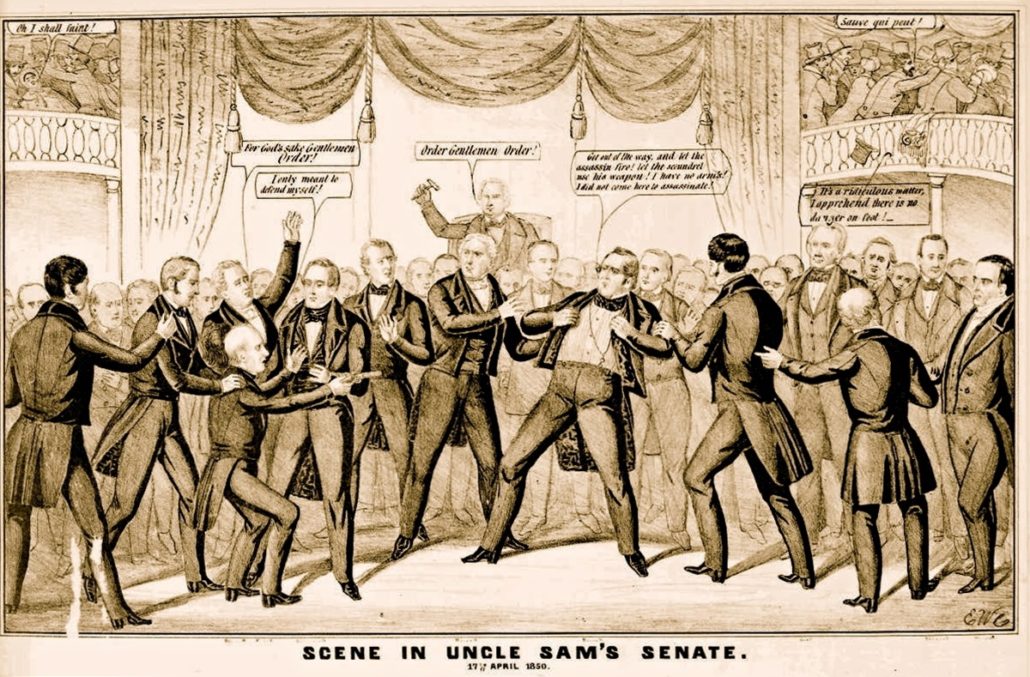It’s probably been a few years since your last debate class, but even if you’ve never needed to formally lay out public arguments, 2-sided discussions are still bound to be a part of your day-to-day life.
How a person argues strikes right at the heart of a person’s character. Arguments, disagreements, and confrontations will naturally make people uncomfortable, and discomfort tends to bring out buried or instinctive responses that reveal one’s true nature. When a person feels threatened, they may use defensive or aggressive responses that reveal underlying insecurities. In short, no one likes to look incompetent or be wrong, but your approach to the purpose of arguing is what matters.

Very few places remain in which a strict set of rules governs conversation and debate, and many countries vary wildly in terms of what it is considered acceptable to discuss is public. The Brits are famous for their anti-confrontational approach while Germans are famously direct. Wherever you are from, it makes sense to learn how to argue in a gentlemanly manner, assuming that is how you would like to be perceived.

The Lost Art of Civilized Discourse
In 1727, Benjamin Franklin organized a group of men into a club called the Junto, otherwise known as the Leather Apron Club. The men in the club came from a number of different backgrounds as well as degrees of education and success. To join the group, one had to answer the following questions correctly:
- Do you have disrespect for any current member?
- Do you love mankind in general regardless of religion or profession?
- Do you feel people should ever be punished because of their opinions or mode of worship?
- Do you love and pursue truth for its own sake?

Franklin expected that discussions were to be conducted “without fondness for dispute or desire of victory.” In other words, a conversation was guided by the exploration of ideas and mutual improvement rather than the pursuit of winning or argument for argument’s sake. While Franklin’s Leather Apron Club uses a narrower set of questions that one today would likely use, they still lay out the basis for having successful conversations and arguments: mutual respect, tolerance, welcoming, and an open mind.
How to Argue Like a Gentleman
Today, especially in the US, arguing like a gentleman seems to be a lost art. In fact, many people choose to avoid arguments and discussions on substantive topics altogether because it’s simply too uncomfortable. Unfortunately, never having one’s opinion challenged isn’t validation, nor is it something to be praised. How else do we learn if we aren’t willing to consider new information? And furthermore, small talk on neutral subjects gets boring very quickly.

Why Is It So Hard to Have a Productive Argument?
There are a few key reasons why it can be so hard to have a civilized discussion or argument these days:
- The belief that a person is entitled to have an opinion, unchallenged, no matter what it is. People who challenge other people’s opinions can be seen as disrespectful rather than earnest.
- Due to this “opinion protectionism” many people cut themselves off from any discussion because there is “nothing to discuss”. They’ve already made up their mind, which they see as the only purpose for engaging in a conversation about it.
- Opinions and beliefs can be quite personal, so it can be difficult to not take questioning and criticism personally
- Competition is valued more than substance or growth; the goal is to “win” and compromise is stigmatized as “losing”
- Traditional masculinity demands that men show no weakness, which is both restrictive and outdated

The Gentleman’s Philosophy
Here are some things we believe very firmly in at the Gentleman’s Gazette. Debate, conversation, and discussion should be encouraged. Opinions are not sacred. Winning is never the goal. Unwillingness to learn, grow and change doesn’t make you more of a man – it just makes you too insecure to explore other ideas. Finally, freedom of speech, the expression of ideas, and open and challenging dialogue is not something to be taken for granted.
If you haven’t read our article on What It Means To Be a Gentleman Today, it outlines many behaviors that are applicable to arguments as well as life in general.
Ground Rules for a Gentlemanly Argument
An “argument” is an exchange of diverging or opposite views, but it doesn’t have to be heated or angry. Here are the ground rules for having a gentlemanly argument in which both parties can walk away with their mutual respect still intact.
- First, you have to be willing to have an exchange of views. If you declare your position and refuse to budge (referred to as “dropping the anchor”) it is pointless to continue.
- Then, you have to be willing to be “wrong”, as in, you can’t hold your opinions to be sacred, untouchable ideals. There is no such thing as a man who is never wrong. If you believe that, you’re a narcissist and not a gentleman, and no one around you will believe you are one anyway. In fact, you’re probably an insufferable dick. Don’t be that guy.
- Be open to new ideas and to having your ideas questioned. It may not feel comfortable at first, but with practice, it will get easier and feel less personal.
- Stay calm. Raising your voice or using mocking or aggressive tones should be avoided, as the intent behind them is to manipulate – rather than calmly engage with – your conversation partner.
- Note that your body language can be equally important as your tone of voice. Maintain eye contact and avoid defensive gestures such as crossing your arms or rolling your eyes.
- No name calling or personal insults
- Don’t bring unrelated subjects into the conversation. This is an attempt to derail the discussion away from the original topic, and re-engage control over the direction it is going.
- Avoid the common fallacies of argument. This article is well worth a look because it helps define a range of tactics that bad arguers use to gain an edge when they can’t fall back on facts, logic, or reason. For example, politicians love to use “proof by assertion.” Even though a concept has been disproved, they knowingly and repeatedly restate it.
- Finally, you stick to the rules of gentlemanly conduct even if your conversation partner doesn’t. You recognize that you can only control your actions and call out the actions of others, but not everyone will be willing to play by the same rules. A gentleman takes the high road.

With Your Spouse or Significant Other
Arguing with a spouse or a significant other is a much more personal experience, and unlike a conversation with a colleague or a friend, they are nearly impossible to avoid (and shouldn’t be!). The challenges of arguing with a spouse or significant other are different. This is likely the person you are closest to in your life, so extra care is needed to communicate fairly and effectively. In this situation, the need to win can be even more damaging that in other, lower-stakes relationships. Being able to productively argue with your spouse or significant other is a lifelong skill that every gentleman should master.
The above list of gentlemanly argument techniques are all equally relevant with regards to spousal conflict, and they are a great framework for approaching discussions in a healthy way. However, with someone very emotionally close to you, there is an additional list of important actions to avoid because this kind of argument is so personal. Arguments with a spouse can be about very pedestrian things like how to divide up the chores to large life decisions like moving or making a big investment, but also about how actions and words effect feelings.

John Gottman, a 40-year veteran of relationship studies, has observed that he can predict if a couple will break up with 91% accuracy based on the presence of just four main indicators: contempt, criticism, defensiveness and stonewalling.
- Don’t dismiss the concerns of your SO or refuse to engage in a conversation.
- During an argument, don’t use threats (I’m divorcing you!) because threats tip the scales of power unfairly in your favor, and it makes your partner feel insecure about bringing up legitimate issues.
- Don’t bring up old fights, past transgressions that were resolved, or bring up a different concern for the first time. Keep the focus on the topic at hand.
- Don’t exaggerate the actions of your spouse (you do this every time!)
- Avoid actions of contempt at all costs, which are especially poisonous. Eye rolling, name calling, and mockery are all examples of what to avoid because they show how far you are willing to go to dismiss the feelings and concerns of your spouse.
- Don’t offer a fake or defensive apology if one is in order. Apologize properly. “I’m sorry you feel that way” is not an apology because you are avoiding responsibility for what caused the other person to be hurt. It’s their fault that they took your words, and were hurt by it – not yours for having said them.
- Don’t criticize the person, but rather the action. Implying the other person is somehow “bad” can have long-term negative repercussions for your relationship beyond this one argument.
Conclusion
What do you observe about how people engage in arguments? Who do you admire for their approach to difficult or adversarial conversations? Let us know in the comments if you think we missed any important ways in which a gentleman should approach arguments.


Sven, you went to law school. I have argued professionally in the law for 36 years. We both know how to make reasoned arguments. I have a feeling we both know that reason will never beat the emotional attachment to an opinion. What I have learned is to get paid for arguing, otherwise it is a waste of time. You won’t convince anybody, whether you are polite or aggressive. The bottom line is if you have the power to enact your opinion, you don’t need to argue. If you don’t there’s no point in it. IMHO.
Greetings,
Law School taught me to stay out of the Courthouse, and to avoid litigation!
Andrew Gregg
Well said Andrew!
“will never beat the emotional attachment to an opinion”
Spot on. Had a clear cur example of that just today. In my experience though, it’s WHY those first moments and impressions are so critical. Last minute, newly unearthed evidence overturning a jury’s mind only happens on television…
I am glad you are covering this topic. A person who strives to treat others well can be perceived by some as weak. Silence is affirmation after all and good men of good conscious cannot be true to themselves if they do not put voice to the opposing view of a wrong idea. The difficult thing is learning how to make your case then leave. An argument is like staying too long at the blackjack table. After the first hand, win or lose, leave. The first hand is the only hand which offers even odds, after that the house will win. Once you’ve made your well considered point, close the door on any possible nastiness by excusing yourself and striding away majestically.
Knowledge is power.
Most individuals are so ill-informed they are floored by a pertinent fact – one that surprises them by in being counter intuitive and a fact that undermines their position.
If an individual blames the fall of the Roman Empire on immorality – and drawing an example for the USA – ask them if the reign of the Emperor Nero was an immoral time. Most will reply in the affirmative. Point out that Nero reigned around 60 AD and the generally accepted date of the fall of Rome is 476 AD. Quite a long period of immorality to result to a fall!
Point made.
Well SAID Chester, a classic example. When your counterpart has lashed themselves to a false meme or long debunked talking point, move on!
I thought Gentlemen resolved an argument with a slap across the face with a glove and a matching pair of dueling pistols. On the other hand, I strive to conduct myself as does Richard Harris as the character Albus Dumbledore of the Harry Potter Series. Thanks for the article.
I teach argument for a living as part of university writing and literary analysis classes. The main obstacle to effective argument is becoming emotional. Pathos, or emotion, can be used as a quick and dirty tool to win over a crowd (mob?). Just ask politicians from Marc Antony to Donald Trump. However, when the person arguing is so emotionally invested himself the ability to use or listen to reason tends to fail as does any chance of a productive discussion.
Thanks for sharing.
Winning is never a goal??? Realy?????
Let’s discuss it. I think many like to be right or win an argument but is that what a gentleman should be about?
The three goals of an argument – in proper order of importance – are to learn, communicate, and persuade.
I’d suggest than “winning” an argument isn’t always the best goal. If you are engaged in civil argumentation and you are willing to accept well-reasoned points raised by your discussion partner, you may learn new facts or experience a new point of view — and you may conclude the argument with the respect, or at least warm feelings, of your discussion partner.
Joseph, when you start your sentence by “I’d suggest…”, it alone shows that you are a humble person and you are willing to find the truth rather than feeding your ego. I agree with Blake in terms of the goals (earn, communicate, and persuade) which are similar to Benjamin Franklin’s.
It is crucial to show certain traits – humble, caring, listening – in order to achieve those goals and ensure that the other party is not offended.
“Old good days”
A gentleman does not need advice about how to behave like a gentleman. Simplice.
Young men need to learn to behave like gentlemen somewhere as one isn’t born with it. Perhaps in the past, they would learn from their fathers or grandfathers, but where that is no longer the case, tutorials and advice from a site like The Gentleman’s Gazette are useful toward that end.